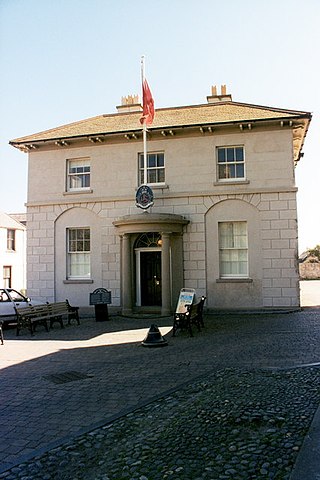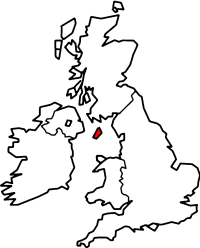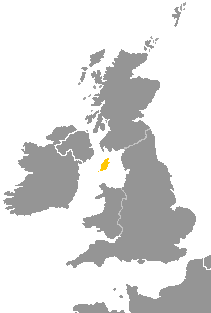Related Research Articles

The Isle of Man or Mann, is a self-governing British Crown Dependency in the Irish Sea, between Great Britain and Ireland. It is recognised as one of the Celtic nations and is the homeland of the Manx people, a Celtic ethnic group. As head of state, Charles III holds the title Lord of Mann and is represented by a Lieutenant Governor. The government of the United Kingdom is responsible for the Isle of Man's military defence and represents it abroad, but the Isle of Man still has a separate international identity.

The Isle of Man had become physically separated from Great Britain and Ireland by 6500 BC. It appears that colonisation took place by sea sometime during the Mesolithic era. The island has been visited by various raiders and trading peoples over the years. After being settled by people from Ireland in the first millennium AD, the Isle of Man was converted to Christianity and then suffered raids by Vikings from Norway. After becoming subject to Norwegian suzerainty as part of the Kingdom of Mann and the Isles, the Isle of Man later became a possession of the Scottish and then the English crowns.

The economy of the Isle of Man is a low-tax economy with insurance, online gambling operators and developers, information and communications technology (ICT), and offshore banking forming key sectors of the island's economy.

Manx, also known as Manx Gaelic, is a Gaelic language of the insular Celtic branch of the Celtic language family, itself a branch of the Indo-European language family. Manx is the historical language of the Manx people.

Mec Vannin is a political party operating in the Isle of Man. Formed in 1962, it seeks to revoke the status of Man as a British self-governing Crown dependency and establish a completely sovereign state, which would be a republic.

The culture of the Isle of Man is influenced by its Celtic and, to a lesser extent, its Norse origins, though its close proximity to the United Kingdom, popularity as a UK tourist destination, and recent mass immigration by British migrant workers has meant that British influence has been dominant since the Revestment period. Recent revival campaigns have attempted to preserve the surviving vestiges of Manx culture after a long period of Anglicisation, and significant interest in the Manx language, history and musical tradition has been the result.
Yn Pabyr Seyr is the newsletter of Mec Vannin, the Manx pro-independence organisation, and publicises their policies, views and comments.

The Manx are an ethnic group originating on the Isle of Man, in the Irish Sea in Northern Europe. They belong to the diaspora of the Gaelic ethnolinguistic group, which now populate the parts of the British Isles and Ireland which once were the Kingdom of the Isles and Dál Riata. The Manx are governed through the Tynwald, the legislature of the island, which was introduced by Viking settlers over a thousand years ago. The native mythology and folklores of the Manx belong to the overall Celtic Mythology group, with Manannán mac Lir, the Mooinjer veggey, Buggane, Lhiannan-Shee, Ben-Varrey and the Moddey Dhoo being prominent mythological figures on the island. Their language, Manx Gaelic is derived from Middle Irish, which was introduced by settlers that colonised the island from Gaelic Ireland. However, Manx gaelic later developed in isolation and belongs as a separate Goidelic language of the Insular Celtic languages.

Manx English, or Anglo-Manx, is the historic dialect of English spoken on the Isle of Man, though today in decline. It has many borrowings from Manx, a Goidelic language, and it differs widely from any other variety of English, including dialects from other areas in which Celtic languages are or were spoken, such as Welsh English and Hiberno-English.

Philip Anderson Gawne, better known as Phil Gawne, is a former Member of the House of Keys for Rushen, a constituency in the Isle of Man.
The legal system on the Isle of Man is Manx customary law, a form of common law. Manx law originally derived from Gaelic Brehon law and Norse Udal law. Since those early beginnings, Manx law has developed under the heavy influence of English common law, and the uniqueness of the Brehon and Udal foundation is now most apparent only in property and constitutional areas of law.

The Cooish is the name of a festival that promotes Manx language and culture that takes place on the Isle of Man each November. The word 'Cooish' is a Manx word that has many meanings. It can translate to mean a chat, a meeting, a cause, an issue, or a get-together.

Thomas Brian Stowell, also known as Brian Mac Stoyll, was a Manx radio personality, linguist, physicist, and author. He was formerly Yn Lhaihder to the Parliament of the Isle of Man, Tynwald. He is considered one of the primary people behind the revival of the Manx language.
John Joseph Kneen was a Manx linguist and scholar renowned for his seminal works on Manx grammar and on the place names and personal names of the Isle of Man. He is also a significant Manx dialect playwright and translator of Manx poetry. He is commonly best known for his translation of the Manx National Anthem into Manx.
Bernard Moffatt is a Manx nationalist who was born in Peel, Isle of Man. Both his mother and father were Manx. He was educated at Peel Clothworkers School, where Manx dancing classes at the School were organised by Mona Douglas, an icon of the Manx cultural revival. Moffatt was enrolled in one of those teams.

Fo Halloo was a militant Manx nationalist group active on the Isle of Man in the 1970s. The group conducted Manx graffiti and poster campaigns, published and distributed newsletters, and was also accused of conducting a number of arson attacks against the homes of English, non-Manx residents.

Culture Vannin is the trading name for the Manx Heritage Foundation, established in 1982 by the Isle of Man Government to promote Manx culture, heritage and language. It was rebranded in February 2014, having previously been known as the "Manx Heritage Foundation", since the former title "held connotations more towards the cultural history of the island" which were not felt to be accurate to the organisation's progressive approach to invigorating Manx culture. Culture Vannin's motto is "Taking our culture forward".
Colin Jerry was a Manx cultural activist best known for his contributions to Manx music through his books, Kiaull yn Theay, published in two volumes. He was awarded the Reih Bleeaney Vanannan in 1991 for his contributions to Manx culture which were 'extensive and staggering.'

Yn Çheshaght Ghailckagh, also known as the Manx Language Society and formerly known as Manx Gaelic Society, was founded in 1899 in the Isle of Man to promote the Manx language. The group's motto is Gyn çhengey, gyn çheer.
Doug Fargher (1926–1987) also known as Doolish y Karagher or Yn Breagagh, was a Manx language activist, author, and radio personality who was involved with the revival of the Manx language on the Isle of Man in the 20th century. He is best known for his English-Manx Dictionary (1979), the first modern dictionary for the Manx language. Fargher was involved in the promotion of Manx language, culture and nationalist politics throughout his life.
References
- ↑ New book charts turbulent history of Manx financial sector – Isle of Man Today Archived 2014-07-14 at the Wayback Machine . 6 October 2009
- ↑ John Belchem (2000). A New History of the Isle of Man: The modern period 1830-1999. Liverpool University Press. pp. 12–. ISBN 978-0-85323-726-6.
- ↑ "'FSFO' minister welcomes shift in Manx tax policy - Isle of Man Today. 29 June 2009". Archived from the original on 15 July 2014. Retrieved 12 June 2014.
- ↑ FSFO - NAIVE OR FAR SIGHTED?. Yn Pabyr Seyr. Issue 1 - June 1991